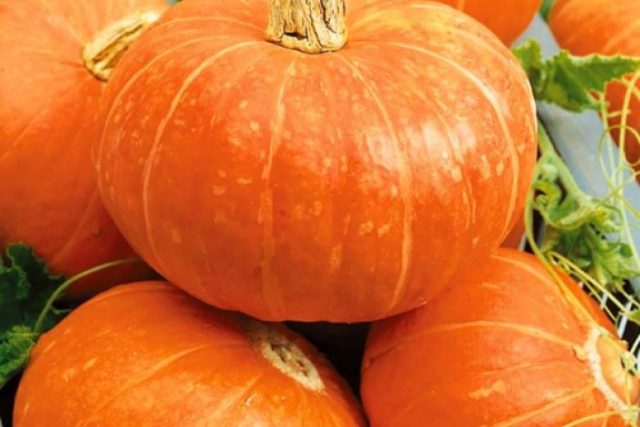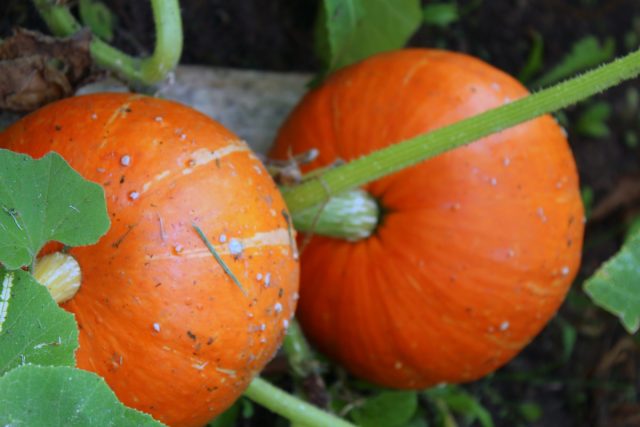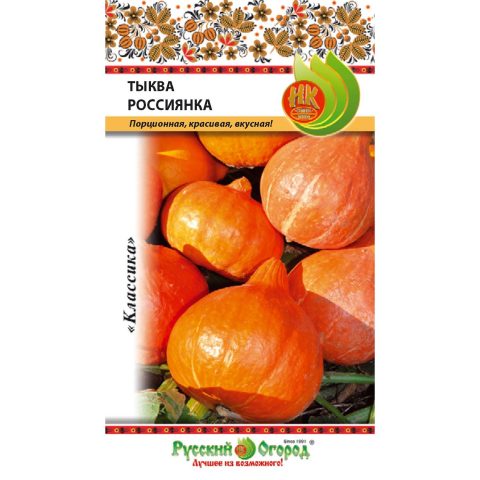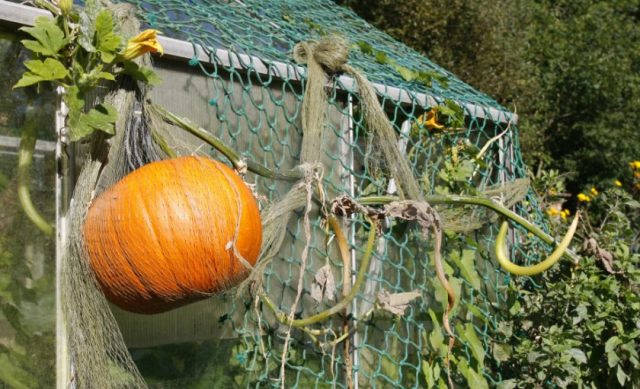Content
Pumpkin Rossiyanka is a large fruit with a rich aroma, sweet pulp and bright color. The variety is included in the selection of VNIISSOK. The vegetable culture has high frost resistance rates, therefore it is suitable for cultivation in the Central regions, including the Moscow region.
There are huge specimens of the Rossiyanka variety, whose weight reaches 60 kg. In addition, this pumpkin has a rich mineral composition: fats, proteins, carbohydrates, calcium, potassium, magnesium and iron salts. Trace elements - cobalt, copper, zinc. Vitamins - groups B, C, PP, carotenoids.
Description pumpkin Rossiyanka
Pumpkin variety Rossiyanka is a medium-growing, early-maturing, hardy plant. The bush is compact. Scourges grow up to 3 m in length. The root system is powerful. The foliage is wide, green, five-lobed.
The full cycle from planting to ripening is 90-110 days. It is preferable to grow Russian pumpkin in open ground. For the full development of a variety, a small area is enough; vertical supports can be used. Flowers are single, large, yellow.
Description of fruits
Pumpkin variety Russian woman is large-fruited. The average weight of the fetus is 2 to 4 kg. The shape is turbid. The surface is smooth. The color of the pumpkin is red-orange.
Taste qualities are harmonious. The pulp is bright orange. The peel is dense, the wall thickness is 6 cm. It contains a large amount of zinc, so it must be removed before cooking. The structure of the inside of the pumpkin variety Rossiyanka is crumbly, soft. The taste is sweet. A distinctive feature of the variety is a melon aroma.
Variety characteristics
Vegetable crops are not demanding on the chemical composition of the soil. However, it develops poorly in depleted soils. Pumpkin belongs to heat-loving plants. Young bushes do not tolerate a drop in temperature even to - 1 ° C. Grows in sunny beds. The Russian woman tolerates drought.
The vegetable is perfectly transported, and due to the possibility of long-term storage, the pumpkin can be consumed until next season. Culture has a universal purpose. Candied fruits, mashed potatoes, and preserves are prepared from pumpkin. Also, the fruits are boiled, fried and baked.
Disease and pest resistance
Pumpkin varieties Rossiyanka suffers from fungal diseases. The bushes are covered with white spots, black mold, leaves and ovaries dry. As a result, growth and development stops. Common diseases of the Pumpkin family: powdery mildew, anthracnose, white, root rot, bacteriosis. The main treatment is timely treatment of plants with systemic fungicides, removal of damaged areas. Diseased bushes should be destroyed to prevent the development of the disease.
Young vegetable crops are weakened by the defeat of melon aphids. These insects multiply rapidly and form entire colonies. The first sign of aphids is twisted leaves. Small parasites suck out the juice, spoil the inflorescences, formed ovaries. You can fight aphids with folk remedies: infusion of wormwood, soapy water, decoction of onion peel.Among the chemicals aimed at combating melon aphids on large-fruited pumpkin, the Russian woman, in the reviews, note: "Tryfos", "Karbofos", "Actellik".
Preventive measures will help prevent the multiplication of infection and prevent fungal diseases:
- deletion weeds, regular weeding of the site;
- use of proven, quality seeds;
- lack of frequent watering;
- moderate feeding of plants with nitrogen fertilizers;
- compliance with the rules of crop rotation.
Advantages and disadvantages
Pumpkin Russian woman is popular among gardeners. It combines a number of positive qualities. Advantages:
- yield;
- early maturity;
- the same size pumpkins;
- disease resistance;
- transportability;
- keeping quality;
- the presence of a high content of sugars in the pulp.
The disadvantages of the pumpkin variety Rossiyanka include the poor quality of the planting material. Self-collected seeds are not suitable for planting, since the culture is of hybrid origin. And seeds sold in gardening stores are often empty inside or spoiled.
Growing and caring for pumpkin Russian woman
Pumpkins of the Rossiyanka variety can be planted in the ground both in the form of seedlings and seeds. For the seedling method, you will need cups with a diameter of 10-15 cm and a specially prepared soil mixture. 2-3 hours before sowing, vegetable seeds are soaked in a growth stimulant solution.
After the sowing procedure, the containers are covered with foil and removed to a warm place until the first shoots appear. The grown seedlings are hardened daily. They are taken out into the street for 20 minutes first. The residence time is then gradually increased.
On the beds, a pumpkin of the Rossiyanka variety is planted when the earth temperature is + 12 ° C. It is recommended to plant the plants in late May or early June. During this period, the threat of night frosts will pass.
A secluded bed protected from cold winds is considered a good place for growing a vegetable crop. The greatest yield will be obtained in moist, loose, fertile soils. In terms of mechanical composition, loam or sandy loam is optimal. The standard planting scheme is 100x100 cm.The immersion depth of the seeds of the Rossiyanka variety is 3-5 cm.
Be sure to prepare the site before planting a vegetable crop.
- Dig up the soil to the depth of the bayonet with a shovel.
- Rhizomes of weeds are removed.
- Nitrogen fertilizers are distributed evenly. The norm is 20 g per 1 sq. m area.
- Level the bed with a rake.
- It is advisable to place pumpkins next to legumes, corn. Unfavorable neighbors will be: watermelons, melons, squash, zucchini.
Pumpkin variety Russian woman loves warmth. The comfortable temperature for full growth is + 22-27 ° С. With a slight cold snap, the plant begins to die. To prevent this from happening, covering material is used in cold regions. It will help retain moisture and warmth in the soil.
Vegetable crops tolerate periods of drought. The branched root system is able to go deep into the ground to a depth of 3 m. It is enough to water the pumpkin Russian woman every 7 days. The volume of water for one plant is 3-4 liters.
In the process of growing a vegetable, do not forget about timely weeding and loosening. To make the bush lush, pinch the top. And when the size of the stem reaches 150 cm, the lateral processes will go.
Fertilizers must be applied without fail. Humus is used from organic substances. From mineral dressings they choose: superphosphate, potassium salt, ammonium nitrate.
In the photo there is a pumpkin of the Russian woman, who is 4 months old. As a rule, the harvest of ripe vegetables begins in late summer or early September. It is important to do this before the onset of the first frost; frozen fruits have a short shelf life.
Ripe pumpkin varieties Rossiyanka has:
- hard, hard skin;
- yellowed leaves;
- lignified stalk;
- deep orange color.
This fruit can be stored for up to 6 months. The main thing is to put the vegetable in a dry, well-ventilated room with a temperature of + 14 ° C. However, you should not take care of it until spring, because irreversible processes begin to take place inside. Seeds sprout, the pulp becomes bitter. The natural movement of juices starts. In this state, harmful substances accumulate in the pumpkin of the Russian woman, which can cause poisoning.
Conclusion
Pumpkin Russian woman is an unpretentious plant. Even a person without experience is able to grow it. Agrotechnical measures require standard. Suitable for cultivation in Central regions. The taste of the vegetable culture is excellent. The variety combines external attractiveness, high fruiting and the ability to long-term storage.












